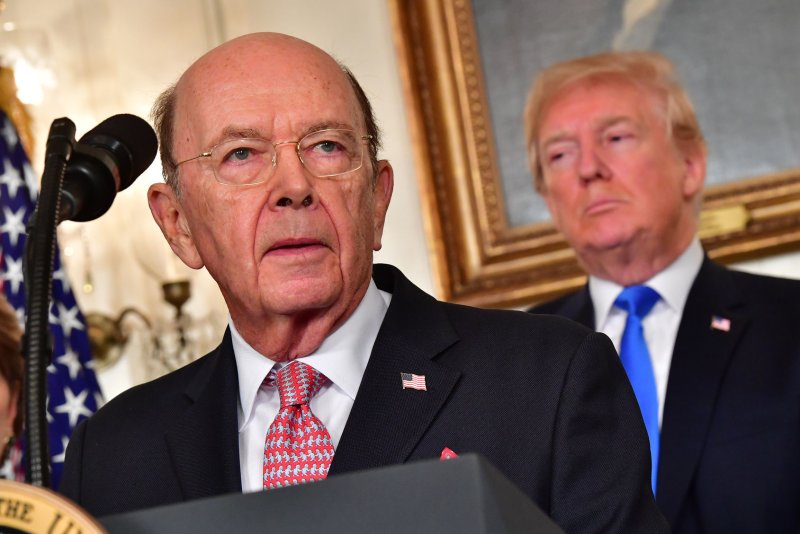Commerce Secretary Wilbur Ross (L) speaks alongside President Donald Trump before the president signed an executive memorandum targeting China on trade. Trump's memorandum is aimed at cracking down what he calls "unfair trade practices" on Chinese economic practices and setting up the possibility of tariffs and restrictions on investment. Photo by Kevin Dietsch/UPI |
License Photo
March 23 (UPI) -- Even while hitting China with new tariffs, the U.S. commerce secretary said it would be "logical" for the second-largest economy to import more U.S. gas.
President Donald Trump on Thursday signed a presidential order that imposed new tariffs on imported Chinese products as a means to protect against what he said was "economic aggression" by Beijing.
The tariffs, which could be worth about $60 billion, are the result of a Section 301 trade investigation launched last summer. The inquiry found that Chinese theft of U.S. intellectual property is costing the U.S. economy billions of dollars.
Speaking to Bloomberg News, however, Commerce Secretary Wilbur Ross said that trade in liquefied natural gas could offset a U.S. trade deficit while at the same time catering to Chinese efforts to green up its economy.
"China needs to import very, very large amounts of LNG and from their point it would be very logical to import more of it from us, if for no reason other than to diversify their sources of supply," he was quoted as saying. "It would also have the side effect of reducing the deficit."
Cheniere Energy in February became the first U.S. company to sign a long-term LNG supply agreement with China. Through subsidiaries, China committed to two LNG sales and purchase agreements that extend through 2043.
In November, Alaska's government and the Alaska Gasline Development Corp. signed an agreement with Chinese lenders and China Petrochemical Corp., or Sinopec, to advance discussions on the LNG potential in Alaska. The agreement was signed in the presence of U.S. President Donald Trump and Chinese President Xi Jinping.
Analysts were somewhat skeptical of the project, even with Chinese support. Cost may be an impediment to the arrangement, and China could secure LNG from cheaper reserves closer to home, notably from Australia or Qatar, which already have established LNG infrastructure.
On Friday, the Chinese Ministry of Commerce was quoted by the official Xinhua News Agency as saying the new U.S. trade pressure put bilateral trade relations in jeopardy.
"We firmly oppose it," a ministry spokesperson said. "It is a typical unilateral and protectionist practice."















